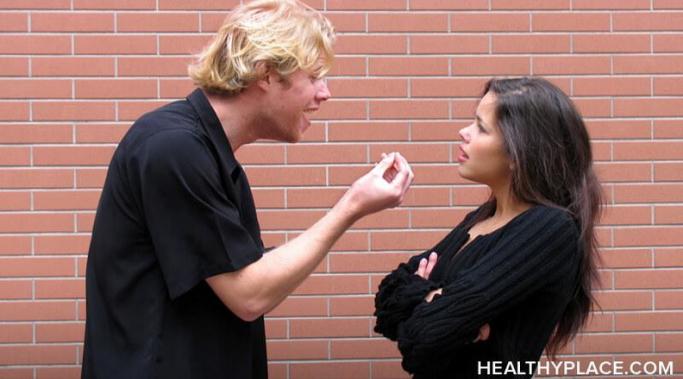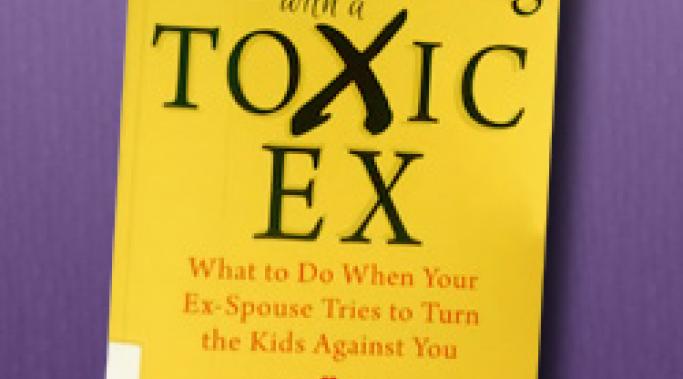Have you read the story of Bluebeard? In short, Bluebeard, an abusive predator, marries a naïve girl and gives her all the keys to his castle, but tells her to never use the tiny key with the beautiful scroll top. So, of course, the girl seeks the door the key will open. She unlocks the door and sees the dead bodies of Bluebeard's former wives. In some versions, the girl escapes Bluebeard's wrath and in others she dies.
Initially, I equated the story of Bluebeard's wife with myself as a formerly abused woman. After reading Women Who Run With the Wolves by Clarissa Pinkola Estes, Ph.D., I agree with the author that Bluebeard is the voice in our heads that traps us in abusive relationships (and many other foul situations).
Verbal Abuse in Relationships
The cycle of violence and abuse typically consists of three phases: tension-building, abuse, and honeymoon. The first two phases describe themselves and the honeymoon phase occurs after the abuse and gives the abuser a chance to beg the victim's forgiveness or otherwise convince the victim to stay. Over time, the tension-building and honeymoon phases tends to shorten or disappear, leaving us to wonder why abusive relationships can last so long. This routine makes staying in an abusive relationship manageable; both victim and abuser come to accept this routine as normal.
We tend to speak of the cycle of violence and abuse as if it were a constantly turbulent system, but we rarely discuss the routine that makes it easier to stay in an abusive relationship, the mind game that soothes the volatile system into manageability. The wheel of violence and abuse shows the cycle concisely, but too narrowly. The wheel shows the cycle as a rolling circle of abuse, honeymoon, tension-building, abuse, honeymoon, tension-building, abuse -- visually repeated infinite times with arrows circling around the wheel until we say to ourselves, "I get it! It's so simple." But then we feel shocked that victims of abuse don't just leave. After all, the wheel makes the cycle of violence and abuse so transparent that victims 'should be able to leave.' Despite its powerful (and necessary) message, the wheel simply cannot tell the whole story.
Description of A "Toxic Ex"
A toxic ex is any co-parent who creates a loyalty conflict for your child(ren). Loyalty conflicts occur when your child believes they must choose one parent over the other.
A toxic ex will do things like:
Restrict or hinder communication and/or contact between you and your children.
Talk badly about you to your children.
Erase and Replace You (This phrase comes from Co-parenting with a Toxic Ex and means to ". . . erase you from your child's heart, mind, and memory and install someone else . . .").
Undermine you.
Persuade your kids to not trust you and urge them to betray your trust (the "divide and conquer to maintain control" routine).
In abusive relationships, the devil you know seems better than the devil you don't. We go back and forth over leaving our abusive mate, wobbling between fear of them and fear of the unknown. It's a tricky balancing act, especially when our partner seems to know just when to put on their nice mask. The sweet phases of an abusive relationship add to the confusion and indecision about just what kind of devil we know.
What kind of devil can be so sweet one minute and so nasty the next? And why can they act kind for long stretches and then turn back into monsters over meaningless situations or words? Why do they hurt us? Why do we stay? Will this relationship hurt the children? Can this relationship last? Should I stay to see if it gets better? Should I run and not look back?
Unfortunately, I am incapable of giving you those answers. And honestly, the longer you take contemplating what those answers could be, the longer you'll be stuck with the devil you know.
So many people beat themselves up over the question "Why can't I just leave?" You want the easy answer? You aren't ready to leave yet.
You
haven't been convinced that the abuse warrants you leaving, or
you lack financial resources, or
you're in business with your abuser, or
the kids are too small, or
the kids are almost out of school, or
the abuser needs you, or
fill in your reason here.
Notice I said fill in your reason here. These are not excuses. The reasons you stay may sound like excuses to someone else, but don't let anyone belittle your decision to stay. I really want to end that sentence with "to stay for now" but truth is that you may never leave. You could be 70 years old and wondering how your spouse is managing to exceed life expectancy, them being so miserable and nasty and all (lots of people are doing this right now).
I want you to be okay with choosing to stay, because making decisions is empowering. Staying is a choice you can make.
Last year, I did a top ten list of the most viewed Verbal Abuse in Relationships blog posts, so I thought I'd do something different this time. The posts on this list earned the largest percentage of comments per times viewed. If you missed them, perhaps you want to add your two cents. Readers tell me all the time they get as much from the comments as they get from the post, so share your experience so we can ALL benefit!
Surviving abuse feels like a miracle. Over all, surviving my abusive marriage has been a wonderful, empowering experience. However, my recovery from domestic abuse hasn't gone exactly as I thought it would. Some things have been downright crappy. This year, the happiness of surviving abuse is diminishing. The crappy is beginning to outweigh the happy. Surviving abuse is a beautiful accomplishment. Surviving recovery . . . well that's what this story is about.
I tried to write this post earlier today, but evidently there were some comments and stories I needed to read first. Stories from addicts, ministers and other abuse survivors reminded me of how much I used to fight my abuser. I fought with my ex-husband so often that I accepted some isolation to spare myself the embarrassment of fighting in front of his friends. At the end, I think every one of the people my ex hung out with knew that I couldn't stand to look at him.
No wonder they believed his stories that I was miserable and unstable. I couldn't open my mouth without something negative about my ex sliding out. My feelings for him surrounded me like a prickly heat and they made me seem like someone I was not. Ugly. Hateful. Mean. My feelings for my ex made it easy for his friends to feel sorry for him, give him a place to stay, and believe his side of whatever story he told.
Denial in abusive relationships is a coping skill abuse victims tend to overuse. I took a trip to Egypt to understand denial during my abusive relationship. You would think that now, after leaving my abuser, I would be on guard for the mighty river. And you would be wrong.
Boy oh boy. Have I ever made some mistakes after leaving my abusive husband. I know that from a distance it looks like I've got my stuff together. I mean, I write this blog and give tips on how to heal from abuse and have a really good grip on the dynamics of abuse.
You would think I'd be off making new kinds of mistakes, having new kinds of adventures and leaving Egypt and it's river to tend to themselves. Ha! Double ha! Oh no - now I'm really laughing at myself . . . hold on a second while I remember what I was talking about . . .









